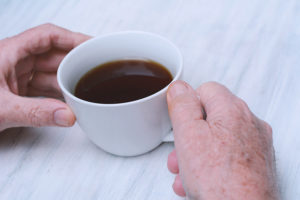 Like many, I’m an avid coffee drinker and I’ve read that coffee is actually good for aging seniors. However, I’m prone to drink it all day long. I don’t have any problem getting to sleep at night, but I wake up at 1, 3 and 5 a.m. I have a feeling it’s the coffee. I’m thinking about switching to tea. Coffee or tea: which is best for aging well?
Like many, I’m an avid coffee drinker and I’ve read that coffee is actually good for aging seniors. However, I’m prone to drink it all day long. I don’t have any problem getting to sleep at night, but I wake up at 1, 3 and 5 a.m. I have a feeling it’s the coffee. I’m thinking about switching to tea. Coffee or tea: which is best for aging well?
Many health nuts and aging experts proclaim tea the winner. It’s because tea is rich in polyphenols which activate important longevity genes. Polyphenols repair cells, prime the immune system, and reduce inflammation. Which are all things that aging seniors need, to reduce the risks of degenerative diseases.
Why Coffee Is Good for You
First, coffee contains high doses of antioxidants—the compounds that help clean your cells of damaging free radicals. These compounds reduce inflammation, and slow the aging process.
But wait, there’s more. A large study from 2013 found that when people increased their coffee consumption by more than one cup per day over a four-year period, they had an 11% lower risk of developing type 2 diabetes.
And according to the Parkinson’s Foundation, there’s a clear connection between coffee drinking and a reduced risk of Parkinson’s disease. Coffee consumption has also been linked to the prevention of dementia and Alzheimer’s disease, liver disease, and colon cancer.
Tea and Aging Well
Like coffee, tea is also rich in antioxidants. The National Cancer Institute reports that antioxidants in tea have been shown to slow the growth of tumors. Another study of over 100,000 adults revealed that people who drank tea three or more times in a week experienced reduced risk of cardiovascular disease and death by any cause.
Some research even suggests that the polyphenols in tea could boost good bacteria in the gut. And, intriguingly, a 2019 study found that regular tea drinkers had slightly higher levels of good cholesterol and lower body mass index (BMI).
Too Much Coffee
But…one large cappuccino too many and suddenly we’re jittery and running to the bathroom. Despite coffee’s many benefits, too much of a good thing doesn’t work. Generally, this is due to coffee’s caffeine content, which varies, but typically averages around 100 milligrams per eight ounces.
A number of health conditions can be aggravated by caffeine, from acid reflux to overactive bladder to irritable bowel syndrome. Excess caffeine can exacerbate anxiety and stress reactions. An older study from 2005 found that caffeine contributed to anxiety and sleep disorders. If you’re prone to these conditions (but love coffee’s rich taste and aromatic smell), try switching to decaf.
It’s worth noting, too, that coffee’s flavor compounds have a dark side—literally. Tannins stick to the teeth, causing staining. Mitigate these effects by swishing with water or brushing your teeth immediately after your morning cup.
Too Much Tea
Tea is a universal beverage the world over (second only to water in global consumption). But sipping Earl Grey all day isn’t always advisable. Although black tea has only about half the caffeine of coffee at an average of around 50 milligrams per eight ounces, this can add up over time. Just like coffee, too much caffeine from tea may cause jitters and irritations to some health conditions. And like coffee, tea’s tannins can also discolor your teeth.
Coffee and Tea for Aging Well
I have to admit that I experience most of the unpleasant side effects of too much coffee. I often choose to ignore them because I enjoy the feeling of stimulation and energy from caffeine. Perhaps there is a compromise that allows me to have my morning boost of java without becoming jittery, running to the bathroom, and nightly interrupted sleep.
I like having a mug to sip on throughout the day. It makes sense to switch to tea after 11 a.m. There’s half the caffeine content in tea which would help lower the risk of poor sleep. Furthermore, there are so many delicious varieties of teas on the market, coming from a diversity of plants, each with polyphenols, antioxidants and flavors.
Both drinks have their aficionados who proclaim advantages. Here is an article from Medium.com that offers 17 reasons to choose tea over coffee. I offer you a snippet:
-
Antioxidants in tea, specifically green tea, improve muscle capacity and running endurance.
-
Tea — especially green tea — has compounds likely to reduce your risk of cancer according to the National Cancer Institute. Green tea possesses polyphenols and black teas have theaflavins and thearubigins. These compounds have antioxidant properties, and may protect cells from DNA damage caused by reactive oxygen species. The polyphenols in green tea have also demonstrated an ability to inhibit tumor cell proliferation and induce apoptosis in laboratory and animal studies.
-
Tea is better at hydrating you.
-
Not only will tea reduce your stress but it will improve your cognitive performance thanks to beneficial interactions between L-theanine and caffeine, both of which are present in tea.
What do you drink?

Recent Comments